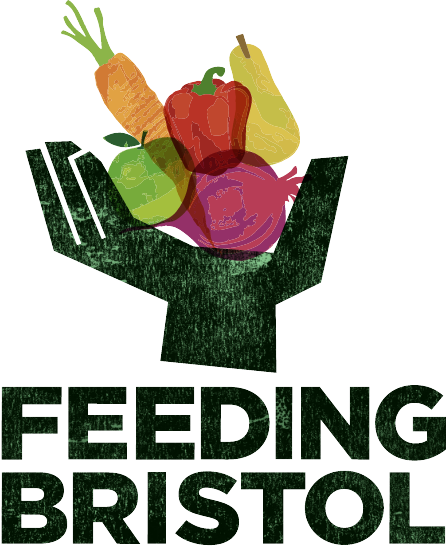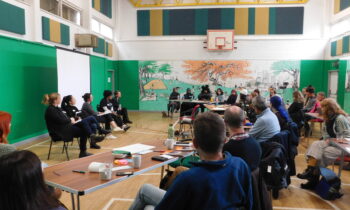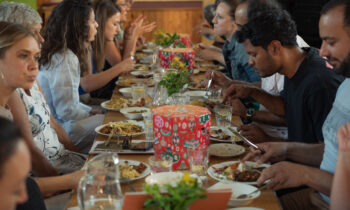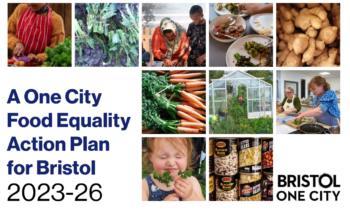As part of Food Justice Fortnight, Bristol Food Network hosted a webinar titled “How can the food sector become more diverse?”. You can watch the webinar here.
We discussed the reasons why the white middle classes make up the majority of medium-to-higher paid roles in the food sector, and the changes organisations can make to become more equitable employers.
Four speakers took part in the panel:
- Shalini Sivakrishnan, speaking about ACH’s work supporting migrants to become small food business owners.
- Nesrin Ayad, sharing her perspective of starting a business after moving to the UK from Egypt.
- Dale Cranshaw from Windmill Hill City Farm, talking about his work in Equality Diversity and Inclusion.
- Ped Asgarian from Feeding Bristol, sharing his experiences as a person of colour working in the food sector.
- Eloise Morton from Square Food Foundation discussing the programme ‘How to Be a Chef’ aimed at supporting young individuals aged 18 to 25 facing barriers to employment within the hospitality industry.
Why isn’t the food sector changing with the times?
In the webinar we heard about how underlying biases from existing management can mean they continue to employ similar people. There are a lot of unwritten rules in working environments, even in things such as clothing style or choice of transport, and these can create barriers for people who don’t “fit in”. Essentially, they tend to pick people who look and sound “the part” based on their experience of who is in those roles already.
There are also structural reasons why the food sector remains uniform. For growing and farming you need land, which is often passed down through inheritance, making it difficult for people new to the sector to become landowners. Renting land and startup costs are also expensive, meaning people are often reliant on borrowing or being gifted or left money.
The same is true of the hospitality sector. Low-paid roles and insecure contracts are readily available to all, but business owners are much less diverse. When Nesrin was starting her business, she had to learn a lot very quickly about UK food culture; common dishes and ways of serving food in Egypt did not work here. Luckily the support from ACH meant she was able to navigate the new landscape and had the benefit of their connections to help her get catering contracts.
In the third sector, insecure work made up of part-time temporary contracts with minimal pensions makes it unattractive to workers who don’t have the backup of a wealthy family or partner to support them. The third sector cannot guarantee you a stable and well-paid job, but the hours are often flexible and part-time contracts work well around childcare. This is one of the reasons why there are so many women in this sector, but the better paying, secure jobs are still held by men.
What is the impact?
As well as the clear injustice and unfair distributions of wealth, a lack of diversity prevents organisations from developing. New people means new ideas. In the charitable sector (the sector I know best), a diverse range of employees means charities are better able to provide for the people they support. If you’re helping people with a similar experience to your own, you’re more likely to understand what they need and provide meaningful support.
So, what can be done about it?
Here are some top tips from the webinar:
- Review your hiring procedures. Create a transparent and accessible hiring process that includes tactics to reduce the effect of your biases. This can include anonymising CVs and encouraging candidates from diverse backgrounds to apply even if not all essential criteria is met.
- Consider your work culture. When hiring new people, it’s worth reflecting on what code of conduct you’re expecting from your team and where that might stem from. Which ones are necessary for the job, and which ones could be flexible to allow for a more diverse team?
- Companies in the third sector should try their best to bring in longer term funding to provide better conditions, enough that people without financial support from family or partners can take on the role.
- Improve land access. Help with land matching and training for growers (part of the Bristol Good Food Action Plan for Urban Growing and the One City Food Equality Action Plan).
- Organise for better working conditions. It’s difficult to unionise a third sector organisation, but, if there are only a few of you, you have more bargaining power. Winner better conditions for yourselves means there are better conditions to offer to future employees.
Bristol Food Network would like to thank everyone who spoke on the webinar and Feeding Bristol for hosting Food Justice Fortnight.





